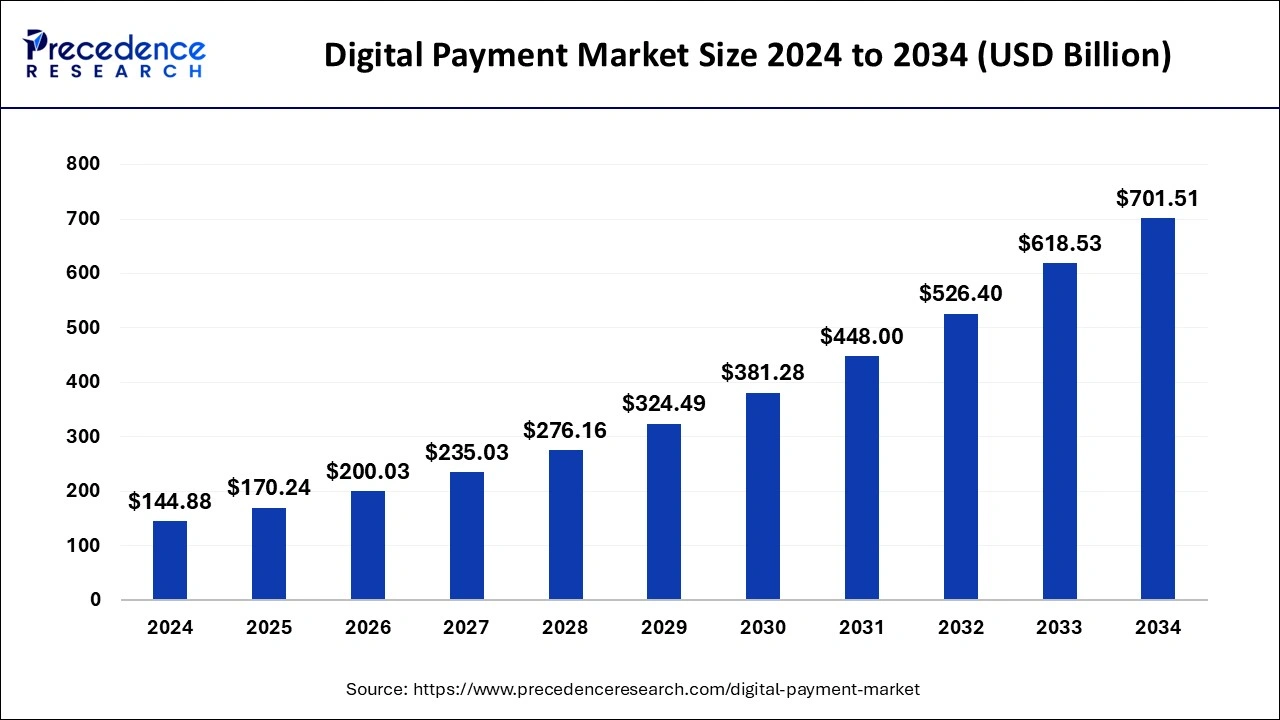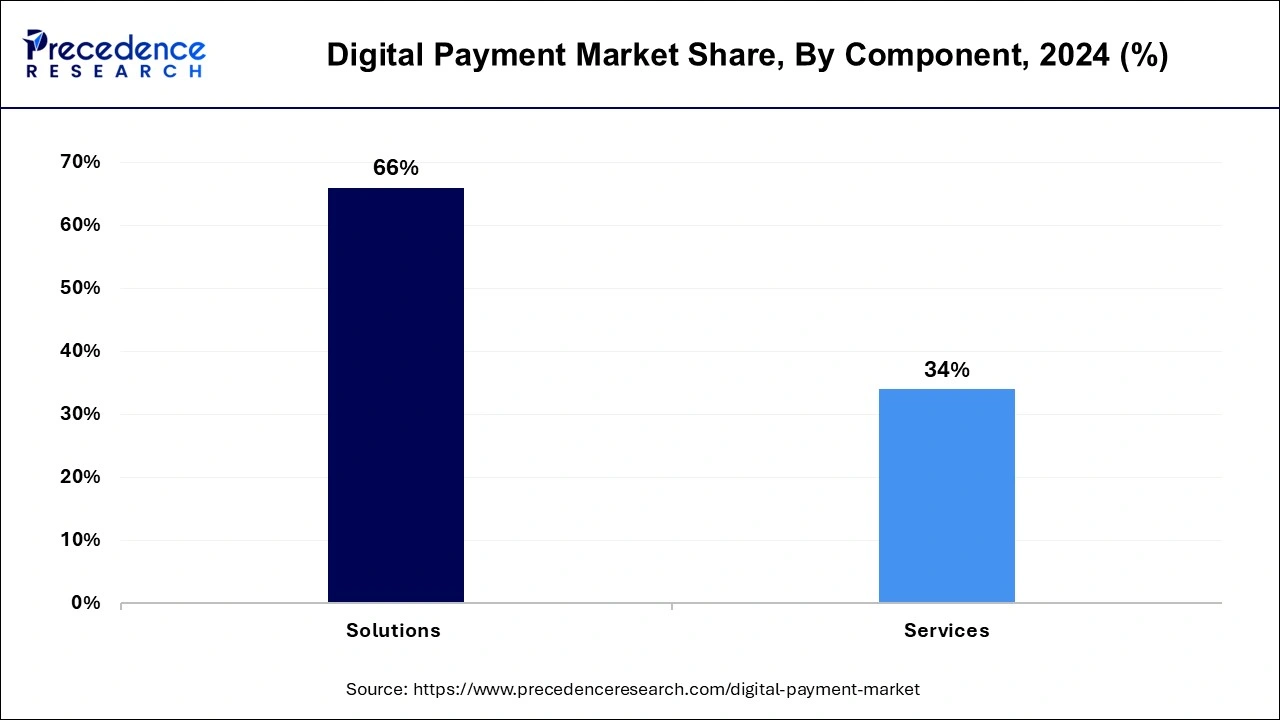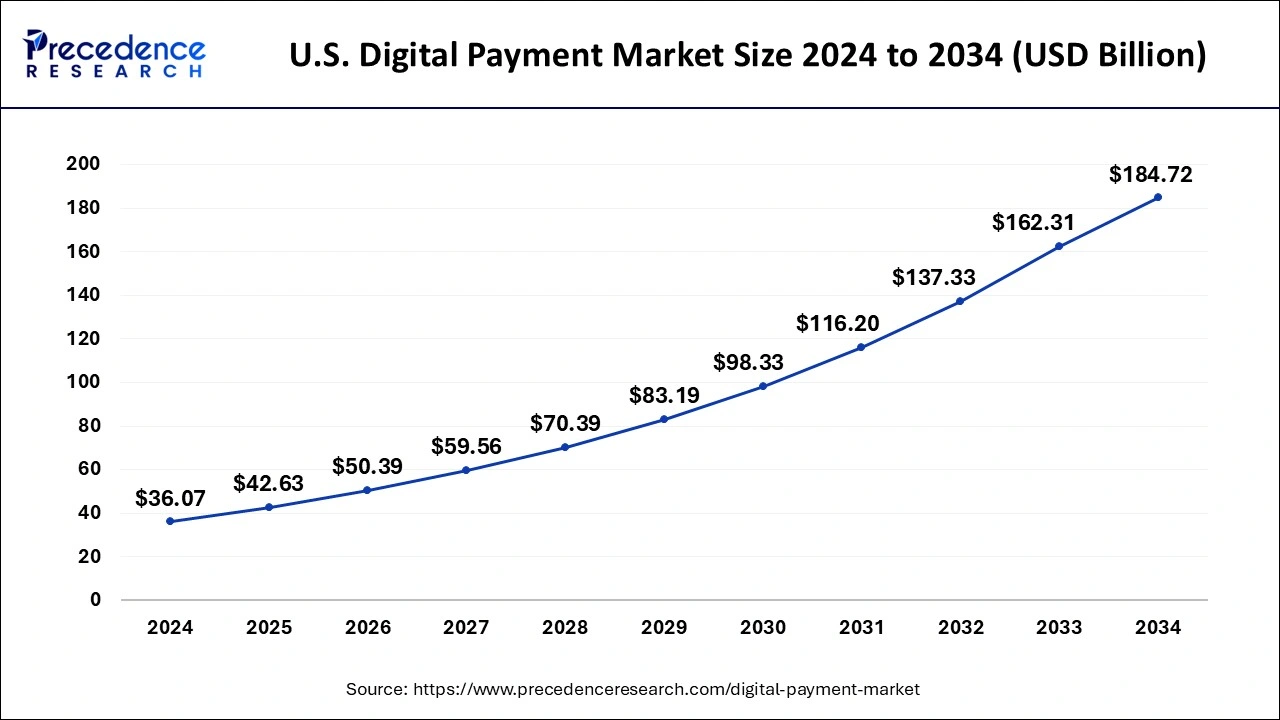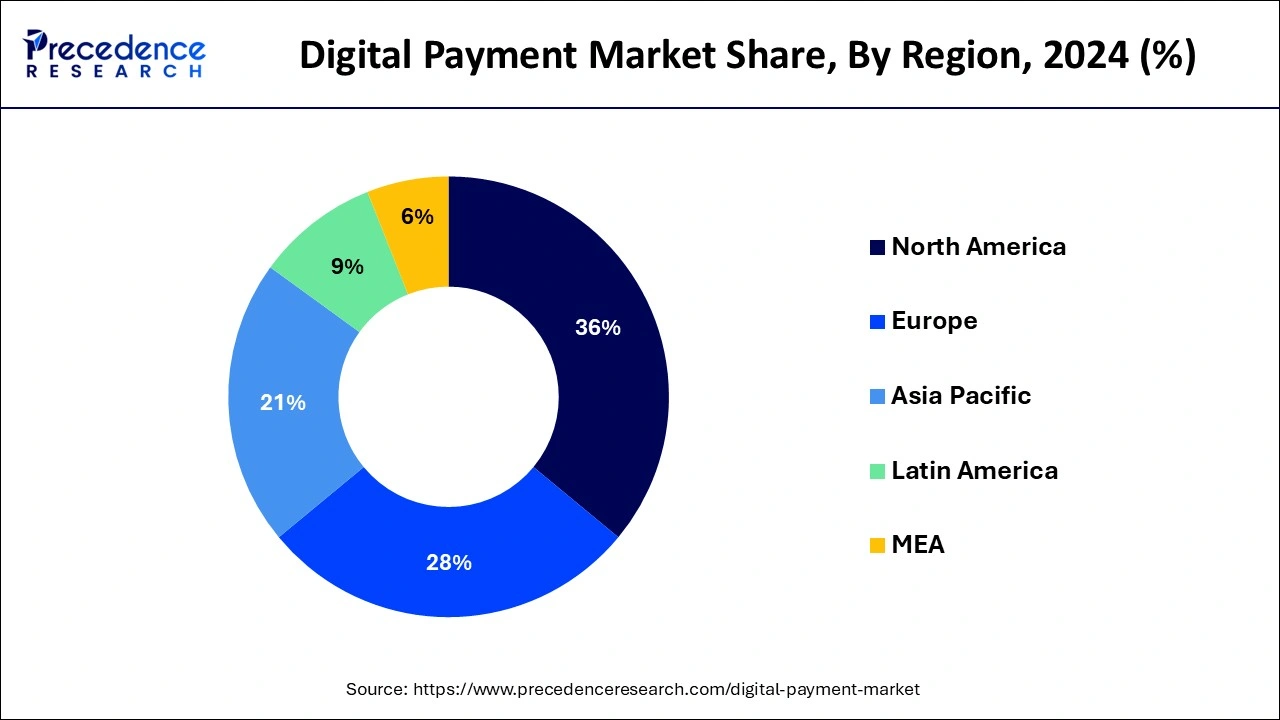What is the Digital Payment Market Size?
The global digital payment market size is accounted for USD 170.24 billion in 2025, and is predicted to increase from USD 200.03 billion in 2026 to approximately USD 790.59 billion by 2035, expanding at a CAGR of 16.60% from 2026 to 2035.

Market Highlights
- North America region accounted highest revenue share of around 36% in 2025.
- By solution, the payment processing segment held a 25.8% market share in 2025.
- By mode of payment, the point of sales segment accounted for 53% market share in 2025.
- By deployment, the on-premise segment has contributed 65.4% revenue share in 2025.
- By enterprise size, the large enterprise size segment hit 59.6% revenue share in 2025.
- By end use, the BFSI segment has generated 24% market share in 2025.
Market Size and Forecast
- Market Size in 2025: USD 170.24 Billion
- Market Size in 2026: USD 200.03 Billion
- Forecasted Market Size by 2035: USD 790.59Billion
- CAGR (2026 to 2035): 16.60%
- Largest Market in 2025: North America
What is a digital payment?
Digital payment or an electronic payment refers to the transmission of value from one payment account to another with no exchange of hard cash involved. Such payments use a digital device such as a mobile phone, computer, and Point of Sales (PoS) along with the digital channel communications including Society for the Worldwide Interbank Financial Telecommunication (SWIFT) or mobile wireless data. Entities involved in processing of digital payment transaction include the merchant, the consumer, the payment network, and the bank. It offers considerable benefits such as cost savings and transparency & security for individuals, governments, companies, and international development organizations. The facility of transition to digital payments and receipts has significantly helped small business around the globe for faster and secured payments at no risk and charges.
Worldwide governments are pushing digital payment systems to enable increased transparency among monetary transactions for people. On the other hand, COVID-19 pandemic has forced governments, educators, businesses, and citizens to adapt to a “new normal” for conducting their daily activities. For instance, the pandemic has augmented digital transformation across geographies in areas including e-government, e-commerce, and remittances. For instance, according to the International Finance Corporation, the internet usage has seen growth of 1.3% in lower-middle-income countries amid January and March 2020. This has led to the shift in consumer preferences and their buying behavior, enabling them to use digital means for conducting retail, business, financial, and government transactions.
How is AI contributing to the Digital Payment Industry?
AI has brought remarkable changes in digital payments by checking fraud in real time, making use of biometrics instead of PIN codes or passwords, streamlining processes, creating tailor-made offers, and providing customer service through chatbots, forecasting consumers' spending habits, facilitating better credit evaluations, backing up buy-now-pay-later models, securing blockchain processes, and enabling quick, safe, and smooth transaction experiences over different platforms.
How Emerging Technologies Shaping the Future of Digital Payment Market?
The digital payment market is continuously evolving, thanks to advances in blockchain, AI, and contactless transactions. Financial services are improving mobile across verticals with a focus on security. Both businesses and consumers are adopting cashless transactions at an unprecedented rate. The emergence of technologies such as biometric authentication and real-time payments has led to new opportunities for growth and convenience in transactions. In October 2024, Unified Payments Interface (UPI) achieved a historic milestone by processing 16.58 billion financial transactions in a single month, underscoring its pivotal role in India's digital transformation. Governments are continuing to trend towards digital economies and cashless solutions. With all of the new opportunities surrounding digital payments, it is only a matter of time before digital payments serve as the backbone of global financial ecosystems that can provide enormous opportunities for innovation, inclusion, and profitability.
Digital Payment Market Growth Factors
Factors including increasing movement away from cash and rising usage of smartphones has driven growth of the global digital payment market. In addition, the wide adoption of the Internet has boosted global e-commerce sector. E-commerce is further driving evolution of services such as digital payments, insurance, and credit that are being offered at the point of sale by non-financial companies. Also, in recent times, e-commerce platforms such as Alibaba, Jumia, MercadoLibre, and Amazon started adding payments facilitation across their platforms. This is called the embedding finance trend which is anticipated to further accelerate digital payment transactions. This growth of the e-commerce has contributed to an upsurge in digital financial services associated with small businesses and consumers, boosting growth of the global digital payment market. For instance, most of the e-commerce platforms are seeing surge in usage of digital payments, especially digital wallet which is a payment system for helping consumers with safe and instant transactions.
On the other hand, an expanding digital payments industry has scaled up over the past years across emerging economies around the globe due to availability of affordable smartphones and succeeding Internet penetration. Also, the governments and regulators across emerging markets including Bangladesh, Sri Lanka, and Nepal have worked on roadmap for digital transformation to encourage citizens to go cashless. For instance, government of India set up the National Payments Corporation of India (NPCI), a separate entity to promote retail payments. Also, the country has earlier created RuPay, a truly open domestic cards scheme to expand its digital payments ecosystem. Such government initiatives focused on evolution of digital payments is opportunistic for growth of the global market. Also, emergence of 5G technology along with rapid digital transformation trend is expected to create lucrative growth opportunities for the global market. This trend will massively increase network speed and connectivity by empowering both banks and their competitors to enhance and streamline digital payments.
Market Outlook
- Industry Growth Overview: Digital payments keep on being upward trending as users will always crave speedy, uncomplicated, and always-accessible transaction services.
- Sustainability Trends: The shift towards digital transactions eliminates the need for paper, and consequently, eco-friendly financial ecosystems are being created.
- Global Expansion: There is a move towards interoperable platforms that enable digital payments to be scaled up domestically and linked cross-border.
- Major Investors: Visa, Mastercard, PayPal, Stripe, Apple, Google, Amazon, Alipay, and WeChat Pay are the major forces behind investments.
Market Scope
| Report Coverage | Details |
| Market Size in 2025 | USD 170.24 Billion |
| Market Size in 2026 | USD 200.03 Billion |
| Market Size by 2035 | USD 790.59Billion |
| Growth Rate from 2026 to 2035 | CAGR of 16.60% |
| Base Year | 2025 |
| Forecast Period | 2026 to 2035 |
| Segments Covered | Component, Deployment Type, Organization Size, Industry Vertical, and Region |
| Regions Covered | North America, Europe, Asia-Pacific, Latin America, and Middle East & Africa |
Segments Insights
Component Insights
Depending upon the component, the solutions segment accounted largest market share in 2024. Solution segment comprises of various segments including payment gateway, payment processing, payment wallet, payment security and fraud management, and point of sale (PoS). Growth of this segment is attributed to wide adoption of payment processing solutions to enable customers with seamless online shopping experiences.

In addition, use of multi digital wallets is further advancing growth of solutions segment. For instance, according to latest data from FIS PACE, 32% of mobile wallet users across the globe have three or more mobile wallets such as Google Pay, Apple Pay, and others downloaded on their smartphones. The study has also indicated that, Millennials and Gen Z are increasingly using digital wallets. Further, technological advancements in digital wallets is projected to enable them store and allow for extensive payment transactions along with seamless and on-demand access to alternative digital assets such as cryptocurrency.
Moreover, the spread of digital payment methods has significantly transformed point of sale. For instance, in current times, new POS can be a smart phone, watch, or TV; a retail kiosk or even an embedded sensor in a thermostat or refrigerator. This innovations across the digital commerce is anticipated to create lucrative growth opportunities solutions segment.
Industry Vertical Insights
Depending upon the industry vertical, the Banking, Financial Services and Insurance (BFSI) segment is the dominant player and is anticipated to have the biggest impact on digital payment market. In past several years, insurance, financial services, and stockbroking businesses have observed a massive change in the way they disburse and receive funds. Therefore, upsurge in demand for digital payment for domestic and cross-border transactions mainly boosts growth of the BFSI segment. Also, BFSI sector is seeing rising preferences for digital payments among consumers due to increased internet usage and rapid smartphones adoption trend.
On the other hand, banks are enhancing their offerings associated with digital payments to compete with other solution providers, such as Google, Facebook, and Amazon. For instance, in February 2022, The Bank of America Corporation, an American multinational investment bank and financial services company collaborated with Banked Ltd. to launch Pay by Bank, the online payment solution to enable customers of e-commerce companies to pay straight from their bank account. According to the company, this strategy is a part of its continual series of technology investments.
However, retail & e-commerce segment is expected to witness highest growth rate during the forecast period due to significant growth in use of mobile-based payment solutions among consumers for retail payments. In addition, ongoing trend of unmanned convenience stores is further anticipated to create lucrative growth opportunities for this segment. For instance, in December 2021, LG Electronics extended its unstaffed retail stores with the announcement of 30 unstaffed stores up and running by the June 2022 to meet demand for contactless shopping.
Regional Insights
What is the U.S. Digital Payment Market Size?
The U.S. digital payment market size is estimated at USD 42.63 billion in 2025 and is predicted to be worth around USD 208.84 billion by 2035, at a CAGR of 17.22% from 2026 to 2035

The North America region dominated the market with largest revenue share in 2024. This region includes U.S. and Canada. Growth of the market in this region is mainly attributed to continuous adoption of digital wallets and mobile payments by U.S. consumers. For instance, according to the recent survey, over four in five Americans uses some form of digital payment including in-app or browser-based online purchases, person-to-person (P2P) payments, and in-store checkout by using mobile phone.
North America: U.S. Digital Payment Market Trends
The U.S. market is expanding rapidly as consumers increasingly prefer mobile wallets, digital and contactless payments over cash, driven by high smartphone and internet penetration and e-commerce growth. Digital wallets like Apple Pay, Google Pay, PayPal, Venmo, and Cash App have become mainstream for both online and in-store purchases, although some small merchants still lag in acceptance.
Technological advances in digital payment industry in North America is expected to create lucrative growth opportunities for the market. This platform offers feature to split payment of online purchases through combinations of credit and debit cards, without interest or added costs. This way, the platform is projected to help user reduce cost burden on individual cards, increase financial privacy, and build credit scores.

Asia-Pacific is considered as highest growing region in digital payment market. This region includes China, India, Japan, South Korea, and rest of the world. Initiatives undertaken by major countries in this region to enhance digital payment sector is one of the major factors driving growth of the market. For instance, government of India is actively working on its strategy to digitize the economy and financial sector. The country has recently introduced Bharat Interface for Money-Unified Payments Interface (BHIM-UPI) which has emerged as one of the preferred payment modes for Indian citizens. Also, huge growth of digital payment sector in China is driving growth of Asia-Pacific region. More than 90% of Chinese urban consumers uses Alipay or WeChat Pay, the two premier digital payment in country.
Asia Pacific: India Digital Payment Market Trends
India is expected to witness remarkable growth in the digital payments market thanks to the supportive government policies, mobile-first strategy, QR-code-based acceptance, and extensive super-app integration. The lower-income population was brought under the radar by financial inclusion programs, while the interoperable systems facilitated daily payments of all sorts, such as lending, insurance, and merchant services, thus making digital transactions common in both urban and rural settings.
On the other hand, China is developing Digital Currency Electronic Payment (DCEP) or e-CNY, a digital currency which is possibly only months away from a country-wide launch. This emphasis on digital currency by government of China is projected to create lucrative growth opportunities for the digital payment market.
Digital Payment Market Companies
- PayPal: PayPal's worldwide network is at the center of the company's activities, facilitating wallet usage, online checkout, peer-to-peer transfers, and merchant processing across the different integrated platforms.
- Fiserv: Fiserv has a full spectrum of payment processing, banking technology, and merchant solutions, including Clover point-of-sale systems that enable seamless commerce across all channels.
- FIS: FIS's enterprise banking and Worldpay's merchant solutions come with payment integration and financial experiences that businesses can scale up or down.
- Global Payments
- Mastercard
- Square
- ACI Worldwide
- JPMorgan Chase
- Apple Inc.
- 2Checkout now Verifone
- OpenWay Group
Recent Developments
- In March 2025, National Payments Corporation of India (NPCI) has unveiled BHIM 3.0, an upgraded digital payment platform designed to improve user experience and financial inclusivity. (Source: https://www.thehindubusinessline.com)
- In January 2025, Elon Musk-owned social media platform X is collaborating with Visa to introduce a real-time payment system, marking progress toward Musk's long-standing goal of transforming the platform into an "everything app." X partners with Visa to launch real-time payments, marking progress in Elon Musk's vision for an 'everything app.' The service will support digital wallets and bank transfers. (Source: https://www.business-standard.com)
- In June 2022, Trust Payments, the UK-based company signed an agreement with Fiserv, Inc., a global fintech and payments company to support its global expansion and growth plans. Through this agreement, the Trust Payments is projected to provide its clients with on-demand payment capabilities through acquiring-as-a-service (AqaaS) capabilities from Fiserv.
Segments Covered in the Report
By Component
- Solutions
- Payment Gateway Solutions
- Payment Processing Solutions
- Payment Wallet Solutions
- Payment Security and Fraud Management Solutions
- Point of Sale (POS) Solutions
- Services
- Professional Services
- Consulting
- Implementation
- Support and Maintenance
- Managed Services
- Professional Services
By Deployment Type
- On-premises
- Cloud
By Organization Size
- Small and Medium-sized Enterprises
- Large Enterprises
By Industry Vertical
- BFSI
- Retail and Ecommerce
- Healthcare
- Travel and Hospitality
- Transportation and Logistics
- Media and Entertainment
- Other
By Region
- North America
- Europe
- Asia-Pacific
- Latin America
- Middle East & Africa (MEA)
For inquiries regarding discounts, bulk purchases, or customization requests, please contact us at sales@precedenceresearch.com
Frequently Asked Questions
Ask For Sample
No cookie-cutter, only authentic analysis – take the 1st step to become a Precedence Research client
 Get a Sample
Get a Sample
 Table Of Content
Table Of Content




 sales@precedenceresearch.com
sales@precedenceresearch.com
 +1 804-441-9344
+1 804-441-9344
 Schedule a Meeting
Schedule a Meeting